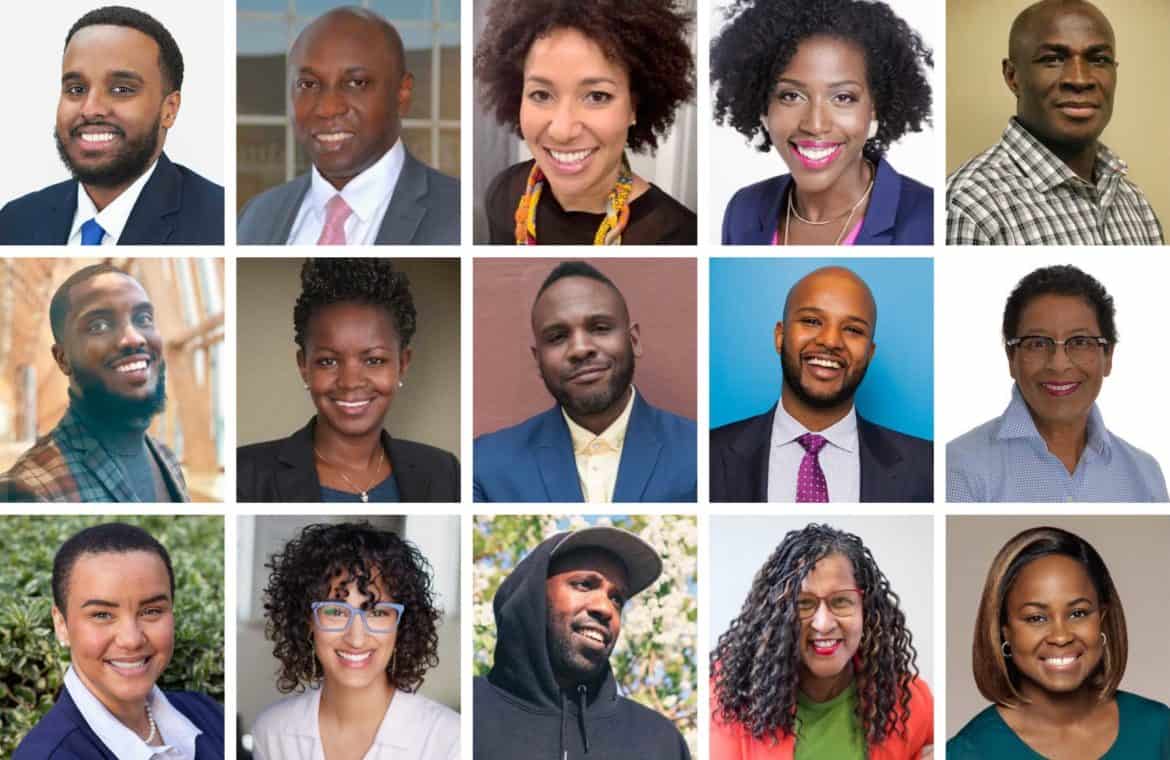The Foundation for Black Communities has a broad mandate to understand communities’ needs and to build trust and capacity so those communities’ futures are defined and stabilized in perpetuity. Doing so starts with a fresh take on governance.
Liban Abokor’s first experience with non-profits was as a high school student in his downtown Toronto neighbourhood. He attended an after-school program with Central Neighbourhood House, a community organization that offers youth a safe space. As he entered into philanthropy, he noticed how the program he’d relied on in his youth struggled to get funding every year. It has stuck with him throughout his career in the philanthropic sector.
Black-led and Black-serving organizations are being left behind. In December 2020, the groundbreaking study Unfunded: Black Communities Overlooked by Canadian Philanthropy, from the Network for the Advancement of Black Communities and Carleton University, revealed the stark reality: in 2017 and 2018, for every $100 given by Canada’s 40 leading foundations, only 30 cents went to Black-led organizations.
The FFBC exists to ensure Black communities have resources to thrive. These communities are working on … food security, housing, and senior living, and they have been ignored.
Liban Abokor, Foundation for Black Communities
In 2020, Abokor – along with Rebecca Darwent, vice-president of the Laidlaw Foundation, Djaka Blais-Amare, director of grants and racial equity strategy at the Calgary Foundation, and Joseph Smith, vice-principal at Marc Garneau Collegiate Institute – started a working group that looked at the systemic discrimination faced by Black-led organizations. In the same year, they launched the Foundation for Black Communities (FFBC), the first philanthropic fund in Canada focused on Black communities.
“We want to have the agency to define [our] own futures in perpetuity,” says Abokor, executive director at Youth LEAPS and school fellow at the School of Public Policy and Administration at Carleton University. “The FFBC exists to ensure Black communities have resources to thrive. These communities are working on issues such as food security, housing, and senior living, and they have been ignored. We want to support them.”
We want to have a better reality for communities … Years of underinvestment hasn’t allowed us to build up structures.
Djaka Blais-Amare, Calgary Foundation
“The initial idea is really grounded in decades of working in Black communities,” says Blais-Amare. “Black organizations have to go through this delicate balance of getting resources while trying to increase capacity. We want to have a better reality for communities.”
Canada’s Black population is now more than 1.2 million people, and the Prairies is the fasting-growing region. “Years of underinvestment hasn’t allowed us to build up structures,” says Blais-Amare. “Out west, we don’t have a lot of organizations that are established with the ability to show impact.”
Black people face systemic discrimination, higher unemployment, and wage disparities. In 2017, the United Nations Human Rights Council reported that it had “deep concern” about the lives of Black Canadians. Blais-Amare says Black-led organizations are affected by long-held public and philanthropic interests that don’t take into consideration serving minority communities.
“Black-led organizations are seen as having less capacity,” says Blais-Amare. “For a long time, the government push was ‘We should be serving all for the sake of equality.’ Organizations would say, ‘We serve Black communities,’ and government would say, ‘Okay, but anyone should be able to come.’ Mainstream organizations don’t have the same scrutiny.”
We have a system where people receive tax benefits for giving. Those funds belong to the communities, but Black communities are not getting the benefit.
Liban Abokor
In the 2021 federal budget, the government announced the development of a $200-million fund to support Black-led philanthropic work. Earlier this year, it issued a call for proposals to establish a Black-Led Philanthropic Endowment Fund. The FFBC submitted a proposal.
“Our philanthropic system relies on preferential tax treatment for charities and foundations,” says Abokor. “You cannot have the current philanthropic system without support [from] Black communities [who co-subsidize this sector]. We have a system where people receive tax benefits for giving. Those funds belong to the communities, but Black communities are not getting the benefit.”
We can’t just find board members; we need people who understand the mission. We need people the community can trust.
Liban Abokor
An organization focused on community couldn’t look for board members in the traditional way. The team wanted to ensure that Black communities felt ownership of FFBC.
“We are Canada’s first philanthropic foundation [aiming to support and] stabilize Black communities,” says Abokor. “There are institutional and structural gaps, especially after coming out of the pandemic. We can’t just find board members; we need people who understand the mission. We need people the community can trust.”
The key was to create a process that would build trust by having people in the community identify people who they trust and believe have the skills to be stewards of the fund. “The foundation manages public wealth [of] Black communities,” says Abokor. “Accountability and representation are important. Community representation is needed at all foundations.”
A typical board recruitment process is similar to posting a job ad: organizations ask people to apply for a position and candidates are interviewed. Sometimes organizations will hire consultants to manage recruiting, perhaps even approaching people directly to apply.
Because it’s your community nominating you, it’s an honour and privilege to be on the board. You have that assurance that the community supports you.
Liban Abokor
The FFBC team decided to take a different approach: instead of applying, people would have to be nominated to be considered for the board. Nominations could come from anyone from the Black community. Those nominating would describe why the person fit the criteria to be a board member and how the person contributed to the Black community. By using this method, people who typically would not apply for board positions could be considered. “We wanted to unlock talent who wouldn’t see it and may not recognize the role” they could play, Abokor says.
By bypassing the usual recruitment process, Abokor hopes board members feel a stronger sense of community and service. “Because it’s your community nominating you, it’s an honour and privilege to be on the board,” he says. “You have that assurance that the community supports you.”
The FFBC team released a call for nominations in 2021 in hopes of filling the board with a diverse group from across Canada. They were surprised to get more than 130 applications and had to balance geographic diversity and different skill sets to get the right mix.
Given the importance of the foundation and its commitment to the community, it gives me comfort to know the process is so rigorous to be on the board.
Elizenda Jean-Claude, FFBC board member
“We could’ve had a board before with people we already knew,” says Blais-Amare. “The genesis of non-profits is to try to build and get people engaged. We’re trying to build up a governance organization, and we want to be a significant player in philanthropy to engage in Black communities. We wanted informed building of the board. You hear from organizations saying it’s hard to find Black people for their boards, but we found 130 people.”
Eleven new members, representing every region of the country, join the four co-founders on the board. One of the main benefits of using this process is identifying leaders who may not have been a part of the philanthropic community. The new members include an IT director based in the Prairies, a Toronto law professor, and a former MP in Quebec. “We could only find these people using this process,” says Abokor.

Elizenda Jean-Claude was contacted about her nomination in late December 2021. As a senior manager in HR strategic initiatives and business transformation at Bell Canada, she was drawn to the FFBC. “Given the importance of the foundation and its commitment to the community, it gives me comfort to know the process is so rigorous to be on the board,” she says.
She worked with Bell Media in the launch of Bell’s Let’s Talk Diversity Fund, focused on supporting mental health programming for BIPOC communities. She’s also the co-founder of the podcast From Where We Stand: Conversations on Race and Mental Health. She was pleasantly surprised to be nominated and is “grateful” to be a part of FFBC.
“I’m attracted to the FFBC mission,” Jean-Claude says. “The foundation has a broad mandate and they’re doing things differently. We have a deeper desire to help the community build capacity. Black communities are looking for agency. They want to be heard and understood. We’re spending time with different organizations to understand what their needs are.”
We want Black people to feel understood, supported, and also empowered in their communities in a sustained way.
Elizenda Jean-Claude
Last year, FFBC partnered with the Government of Canada, the Edmonton Community Foundation, the Calgary Foundation, and the Vancouver Foundation to give out grants supporting programs to deal with vaccine hesitancy in Black communities. This year, FFBC is going through its first major round of applications through its Ontario Youth Wellness Grant, a program focused on sports and recreation programs for Black youth in Ontario. Organizations can receive up to $25,000 in grants. Applications close on August 1 and recipients will be announced in October. With the recent launch of a new website, the hope is to garner more attention for the fund.
“We’re looking at the mission and the expectations of the community,” Jean-Claude says. “We’re building a strong, stable foundation, and we also have to take action right away. We don’t want to rush and cut corners because we are building the foundation for the long-term. However, we understand our communities do have expectations and want us to move fast. We want to strike the right balance. We want Black people to feel understood, supported, and also empowered in their communities in a sustained way.”

